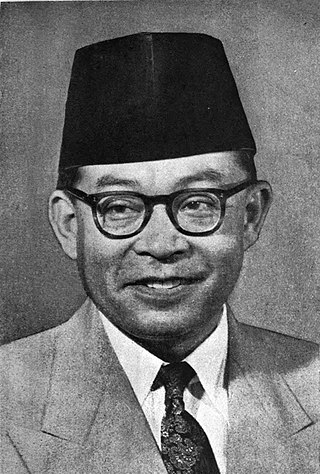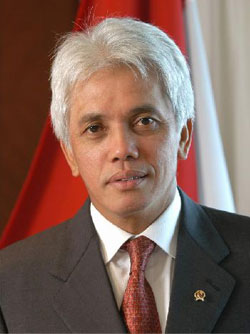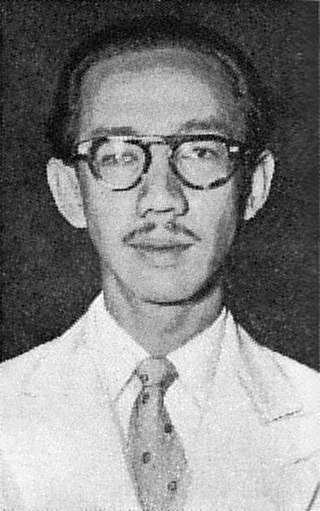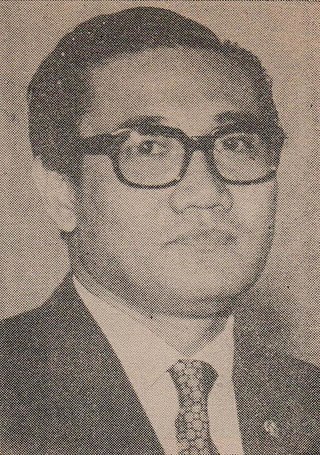
Mohammad Hatta was an Indonesian statesman, nationalist, and independence activist who served as the country's first vice president as well as the third prime minister. Known as "The Proclamator", he and a number of Indonesians, including the first president of Indonesia, Sukarno, fought for the independence of Indonesia from the Netherlands. Hatta was an important figure during the Indonesian national awakening and during the national revolution, as a youth he was politically active both in the Netherlands and the Indies, which led him to be imprisoned in the Boven Digoel concentration camp for his activism, he also played a crucial part in the proclamation of Indonesian independence, being second the person to sign the declaration besides Sukarno, thus naming him as one of the founders of Indonesia.

The Indonesian National Party was the name used by several nationalist political parties in Indonesia from 1927 until 1973. The first PNI was established by future President Sukarno. After independence, the new PNI supplied a number of prime ministers, and participated in the majority of cabinets in the 1950s and 1960s. The party was fused into the Indonesian Democratic Party in 1973. In the years following the reforms of the late 1990s, a number of parties claiming to be the continuation of previous PNIs stood in elections, but gained only a handful of seats.

Yusril Ihza Mahendra is an Indonesian lawyer, politician and academic, who is currently serving as the leader of the Crescent Star Party (PBB) from 2015 to 2024. Previously, he served as the leader of the PBB from 1998 until 2005, Minister of Justice and Human Rights from 2004 until 2007 and 2024 until 2029, and member of the People's Representative Council from 1999 until 2009.

Amir Sjarifuddin Harahap was an Indonesian politician and journalist who served as the second prime minister of Indonesia from 1947 until 1948. A major leader of the left wing during the Indonesian National Revolution, he previously served as Minister of Information from 1945 until 1946 and Minister of Defense from 1945 until 1948. Amir was born into the Sumatran aristocracy and was educated at Leiden University. At Leiden, he became a member of the board of the Gymnasium student association in Haarlem and was involved in the Batak student organization Jong Batak. He returned to Indonesia due to family troubles but continued his education at the Rechts Hogeschool in Batavia.

The Prime Minister of the Republic of Indonesia was a political office in Indonesia which existed from 1945 until 1966. During this period, the prime minister was in charge of the cabinet of Indonesia, one of the three branches of government along with the House of Representatives and the president. Following his 1959 decree, President Sukarno assumed the role and powers of prime minister until his resignation in 1966.

Muhammad Hatta Rajasa is an Indonesian politician who served as the Coordinating Minister for the Economy of Indonesia from 22 October 2009 to 13 May 2014. A member of the National Mandate Party (PAN), he previously served as Minister Secretary of State (2007–2009), Minister of Transportation (2004–2007), and Minister of State for Research and Technology (2001–2004). He was also general Prabowo Subianto's running mate in the 2014 Indonesian presidential election, with the ticket being backed by a number of parties, including the Gerindra party, National Mandate Party, Prosperous Justice Party, United Development Party, the Crescent Star Party and Golkar.

Burhanuddin Harahap was an Indonesian politician and lawyer who served as prime minister of Indonesia from August 1955 until March 1956. He was a member of the Masyumi Party and served as Minister of Defense concurrently with his tenure as prime minister. Afterward, he took part in the unsuccessful Revolutionary Government of the Republic of Indonesia (PRRI) rebellion in West Sumatra.

The Madiun Affair, known locally as the Communist Party of Indonesia rebellion of 1948, was an armed conflict between the government of the self-proclaimed Republic of Indonesia and the left-wing opposition group Front Demokrasi Rakyat during the Indonesian National Revolution. The conflict began on September 18, 1948, in Madiun, East Java, and ended three months later when most FDR leaders and members were detained and executed by TNI forces.

Sjafruddin Prawiranegara was an Indonesian statesman and economist. He served in various roles during his career, including as head of government in the Emergency Government of the Republic of Indonesia, as Minister of Finance in several cabinets, and as the first Governor of Bank Indonesia. Sjafruddin later became the prime minister of the Revolutionary Government of the Republic of Indonesia, a shadow government set up in opposition to the country's central government.

The Presidential Cabinet was the first cabinet established by Indonesia following the 17 August 1945 Indonesian Declaration of Independence. It comprised 20 ministers and four officials. Its term of office ran from 2 September to 14 November 1945.

The Republic of the United States of Indonesia Cabinet was established as a result of the formation of the United States of Indonesia following the transfer of sovereignty from the Dutch colonial power. It lasted less than a year before Indonesia became a unitary state.

The First Hatta Cabinet was Indonesia's seventh cabinet. It was formed by Vice President Mohammad Hatta, who was instructed to do so by President Sukarno on 23 January 1948, the same day the previous cabinet was declared dissolved. Following the second Dutch military aggression, when the republican capital of Yogyakarta was seized and most of the cabinet arrested, much of the cabinet was captured and sent into exile, although it was not formally disbanded. After the political leadership returned effective 13 July 1949 the cabinet continued its mandate until it was reshuffled on 4 August.

The Second Hatta Cabinet was Indonesia's ninth cabinet. It was formed after the Indonesian leadership, which had been imprisoned by Dutch forces, returned to the capital, Yogyakarta. It served from 4 August to 20 December 1949.
Sri Edi Swasono is a professor of economics at the University of Indonesia. He was a member People's Consultative Assembly (MPR) of the emissary group in the New Order era of Indonesia, ruled by President Soeharto. He has been involved in the cooperative world. His wife is the first daughter of Mohammad Hatta, the father of cooperative Indonesia and the first vice president of Indonesia. Sri Edi spent his life to study and to fight for the development of cooperatives in Indonesia.

Achmad Soebardjo Djojoadisoerjo was a diplomat, an Indonesian national hero, and the first foreign minister of Indonesia.

Sumitro Djojohadikusumo was an Indonesian statesman and one of the country's most influential economists. He held ministerial positions under Presidents Sukarno and Suharto intermittently between 1950 and 1978. During his career in government, Sumitro served as Minister of Industry and Trade, Minister of Finance, and the Minister of Research in five different cabinets. He was also the Dean of the Faculty of Economics at the University of Indonesia.

Alexander Andries Maramis, more commonly known simply as A. A. Maramis, was an Indonesian politician and National Hero of Indonesia, who was involved in the struggle for independence. He was a member of the Investigating Committee for Preparatory Work for Independence (BPUPK), the organization which drafted the Constitution of Indonesia. In the early stages of the Indonesian government, following the Proclamation of Independence, he served as both Minister of Finance and Minister of Foreign Affairs. After the end of the Indonesian National Revolution, he served as the Indonesian ambassador to several nations, including the Philippines, West Germany, and the Soviet Union.
Events in the year 1945 in Indonesia. The country had an estimated population of 68,517,300 people.
Events in the year 1949 in Indonesia. The country had an estimated population of 74,530,300.

Ali Wardhana, more colloquially known as Bung Ali, was an Indonesian professor and economist, who served as the third Coordinating Minister for Economics, Finance, Industry, and Development of Indonesia from 1983 until 1988 and the 21st minister of finance of Indonesia from 1968 until 1983. He was one of Indonesia's most senior economic policy-makers during the New Order regime of President Suharto, being a member of the influential Berkeley Mafia, a group of American-educated Indonesian economists who shaped the Indonesian economy during the New Order. He was the longest-serving Minister of Finance, as well as the fifth longest-serving minister in Indonesian history.
















